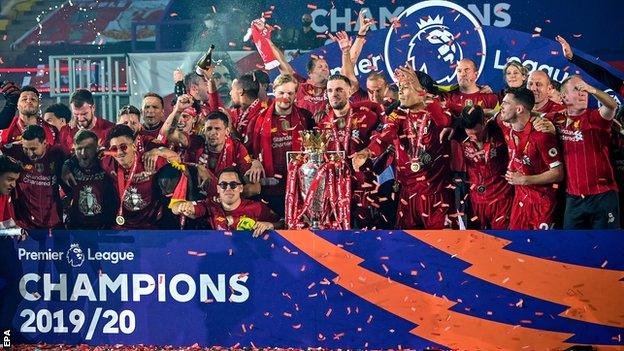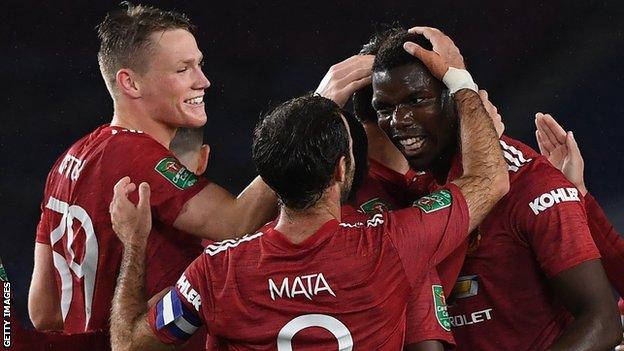Premier League: Radical reform plans could have 'damaging impact'
- Published
- comments

Liverpool won the Premier League for the first time last season
Radical proposals for the reform of English football could have a "damaging impact" on the game, says the Premier League.
Under the proposals, led by Liverpool and Manchester United, the English top flight would be cut to 18 teams.
The plans would see the Premier League hand over the £250m bailout required by the Football League to stave off a financial disaster among its 72 clubs.
The Premier League would also hand over 25% of its annual income to the EFL.
The proposals, dubbed Project Big Picture, would see:
The Premier League cut from 20 to 18 clubs, with the Championship, League One and League Two each retaining 24 teams.
The bottom two teams in the Premier League relegated automatically with the 16th-placed team joining the Championship play-offs.
The League Cup and Community Shield abolished.
Parachute payments scrapped.
A £250m rescue fund made immediately available to the EFL
£100m paid to the FA to make up for lost revenue.
Nine clubs given 'special voting rights' on certain issues, based on their extended runs in the Premier League.
But the plans have been criticised by the Premier League, the government and supporters' groups.
"English football is the world's most watched, and has a vibrant, dynamic and competitive league structure that drives interest around the globe," a Premier League statement said.
"To maintain this position, it is important that we all work together. Both the Premier League and the FA support a wide-ranging discussion on the future of the game, including its competition structures, calendar and overall financing particularly in light of the effects of Covid-19.
"Football has many stakeholders, therefore this work should be carried out through the proper channels enabling all clubs and stakeholders the opportunity to contribute."
Under the proposals, the EFL Cup in its present form would be abolished and the Community Shield scrapped.
In addition, the top flight's 14-club majority voting system would change.
The Premier League statement added: "In the Premier League's view, a number of the individual proposals in the plan published today could have a damaging impact on the whole game and we are disappointed to see that Rick Parry, chair of the EFL, has given his on-the-record support.
"The Premier League has been working in good faith with its clubs and the EFL to seek a resolution to the requirement for Covid-19 rescue funding. This work will continue."
The Department for Culture, Media and Sport condemned what it called a "backroom deal".
"We are surprised and disappointed that at a time of crisis when we have urged the top tiers of professional football to come together and finalise a deal to help lower league clubs, there appear to be backroom deals being cooked up that would create a closed shop at the very top of the game," a DCMS spokesperson said.
"Sustainability, integrity and fair competition are absolutely paramount and anything that may undermine them is deeply troubling. Fans must be front of all our minds, and this shows why our fan led review of football governance will be so critical."

Analysis - 'hugely divisive and potentially seismic'
BBC sports editor Dan Roan
This is a hugely divisive and potentially seismic proposal, threatening the biggest shake-up of the English game in a generation.
Angered by the way the story broke without their blessing, the Premier League has already given it short shrift, viewing this as a regrettable power-grab. In fact one well-placed Premier League source has described it as a "takeover attempt, rather than a rescue package".
Many will see this as an anti-competitive plot to concentrate power in the hands of the biggest clubs, opening the door to them controlling broadcast contracts, financial rules and even takeovers bids in a way top-flight bosses have always been desperate to avoid - a step towards a European Super League, and a means of freeing up space in the calendar to play more lucrative pre-season friendlies.
For years the bigger clubs have wanted more money and more sway. This is the most dramatic manifestation of that to date. But will it get off the ground? There will be huge doubts given 14 clubs would need to approve a plan that would mean fewer Premier League places. But the involvement of the two biggest clubs in the country means this surprising development has to be taken seriously.
At a time when the EFL is facing an unprecedented financial crisis however, it is easy to see why they would support a plan that would hand them the £250m they need to cover the loss of match-day revenue this season. And many in football will welcome the idea of a more redistributive financial model, with 25% of Premier League income shared at a time when the gulf between the divisions has been identified as a major problem.
Indeed, if the threat of this plan helps break the impasse between the Premier League and the government over a rescue package for the EFL, and a more redistributive financial 'reset', perhaps it can emerge as a positive development.

'Gap to Premier League is unbridgeable'
The English Football League confirmed it had been in talks over 'Project Big Picture' and that its chairman Rick Parry was in favour of the plans, first reported in the Daily Telegraph., external
"The need for a complete rethinking regarding the funding of English professional football predates the Covid-19 crisis," he said in a statement.
"Discussion and planning around 'Project Big Picture' has been ongoing for quite some time, unrelated to the current pandemic but now has an urgency that simply cannot be denied.
"The revenues flowing from the investment and work of our top clubs has been largely limited to the top division creating a sort of lottery, while Championship clubs struggle to behave prudently and Leagues One and Two are financially stretched despite enormous revenues English football generates.
"This plan devised by our top clubs and the English Football League puts an end to all of that."
Parry says, in 2018-19, Championship clubs received £146m in EFL distributions and Premier League solidarity payments, compared with £1.56bn received by the bottom 14 Premier League clubs.
He added parachute payments made to eight recently relegated clubs totalled £246m and represented one-third of the total Championship turnover.
Parry said it created "a major distortion that impacts the league annually".
"The gap between the Premier League and the English Football League has become a chasm which has become unbridgeable for clubs transitioning between the EFL and Premier League," he said.

Manchester United are among the clubs driving the change
It is understood Liverpool's owners, the Fenway Sports Group, came forward with the initial plan, which has been worked on by United co-chairman Joel Glazer. It is anticipated it will receive the backing of Arsenal, Chelsea, Manchester City and Tottenham Hotspur - the other members of England's 'big six'.
The idea is to address longstanding EFL concerns about the huge gap in funding between its divisions and the Premier League by handing over 25% of the annual income, although the current parachute payment system would be scrapped.
There would be a £250m up-front payment to address the existing crisis created by the coronavirus pandemic, seen by some as a bid to garner support for the proposals.
In addition, the Football Association would receive what is being described as a £100m "gift".
The Football Supporters' Association said it noted "with grave concern" the proposals, adding they had "far-reaching consequences for the whole of domestic football".
"Once again it appears that big decisions in football are apparently being stitched up behind our backs by billionaire club owners who continue to treat football as their personal fiefdom," it said in a statement.
"Football is far more than a business to be carved up; it is part of our communities and our heritage, and football fans are its lifeblood. As football's most important stakeholders, it is crucial that fans are consulted and involved in the game's decision-making.
"We have welcomed the government's commitment to a 'fan-led review of the governance of football'; we would argue that today's revelations have made that process even more relevant and urgent."
The organisation said it remained "open-minded to any suggestions for the improvement of the governance and organisation of the game".
It added: "We would however emphasise that in our discussions so far, very few of our members have ever expressed the view that what football really needs is a greater concentration of power in the hands of the big six billionaire-owned clubs."
No date has been set for the proposed new-style league to be in operation but sources have suggested 2022-23 is not out of the question.
In order to get down from 20 to 18, it is anticipated four clubs would be relegated directly, with two promoted from the Championship. In addition, there would be play-offs involving the team to finish 16th in the Premier League and those in third, fourth and fifth in the second tier.
It is also planned that, as well as the 'big six', ever-present league member Everton, West Ham United and Southampton - ninth and 11th respectively in the list of clubs who have featured in the most Premier League seasons - would be granted special status.
If six of those nine clubs vote in favour of a proposal, it would be enough to get it passed.
There is no mention of Aston Villa and Newcastle United, both of whom have featured in more Premier League campaigns than Manchester City.

